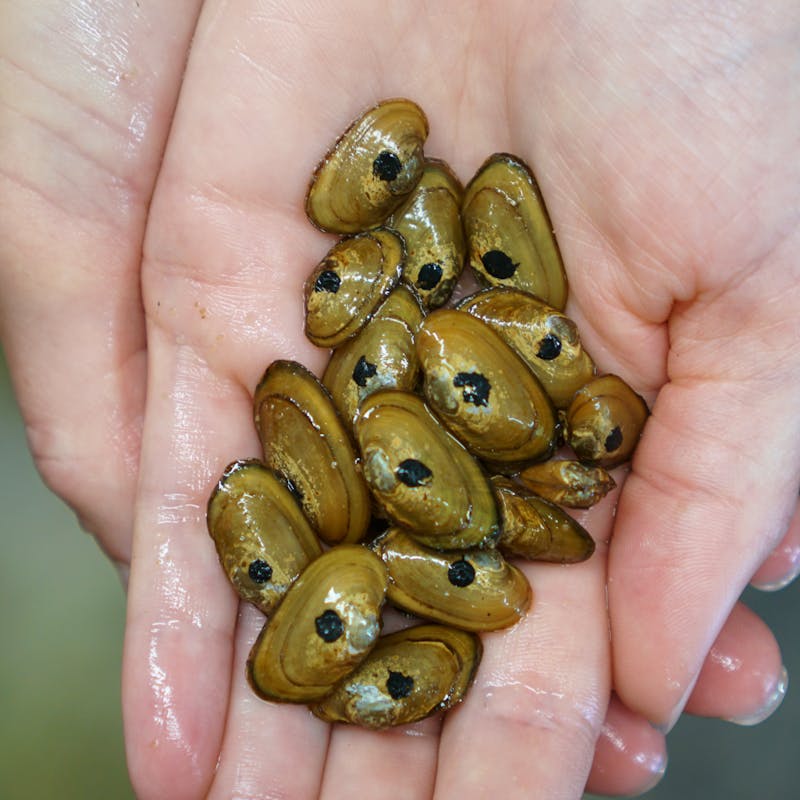Surface coal mining harms wildlife and waterways

© Jeff Gentner / AP
The earth shakes, rocks roll and debris flies. When the dust settles, it looks like a moonscape, not Appalachia, one of the continent’s oldest, most biologically diverse mountain ecosystems and a showcase for bluegrass and foggy vistas.
Surface coal mining—which entails using millions of pounds of explosives to blast away land—has already destroyed more than a million forested acres in the Southeast, including 500 mountaintops and 2,000 miles of streams in Kentucky, Tennessee, Virginia and West Virginia. The blasting—often obliterating entire mountaintops—is done to reach the coal below. The resulting loose, rocky debris is piled in adjacent valleys until they are filled. Some of these areas can stretch 1,000 feet wide and a mile long.
Mining “overburden”—as the industry calls the blasted shale and sandstone—buries streams and entombs headwaters that are crucial to forest ecosystems. These rolling waterways serve as habitat, nurseries and places of refuge for resident and migratory species and provide critical food sources for life downstream. Mountain streams also slow flooding, trap sediment and recharge the groundwater. “Not surprisingly, biodiversity suffers marked declines following the onset of surface mining,” says Greg Buppert, a Defenders staff attorney.
This type of mining is particularly destructive to freshwater fish, salamanders and mussels, which already face a host of other threats including climate change and development. In fact, more than 70 percent of the region’s mussels, 48 percent of its crayfish and 28 percent of its fish are endangered, threatened or identified as species of special concern, according to the American Fisheries Society. The alarming status of mussels particularly concerns conservationists given that these filter feeders and indicators of ecosystem health were once so numerous they practically paved riverbeds when settlers first arrived.
Surface mining not only buries these biologically rich communities, it also exposes bedrock to the elements, causing dissolved salts and metals to leach into waterways, affecting fish, salamanders, aquatic insects and mussels. Certain metals are especially harmful as they move up the food chain. For example selenium, commonly associated with coal seams, is an essential nutrient in small amounts, but in high concentrations it can cause health and reproductive problems in wildlife and humans. It has been linked to deformities in fish larvae like curved spines and two eyes on one side of the head.
Although mining companies are required to offset the damage they’ve caused to ecosystems, in truth, land is rarely returned to even minimum standards. “Reclaimed lands cannot replace the ecological functions of undisturbed forests and headwaters,” Buppert says. “Evidence suggests that the return to a natural system may be hundreds or even thousands of years in the future. Habitat and biodiversity lost can never be fully restored.”
Defenders filed a lawsuit in May challenging the Office of Surface Mining and the U.S. Fish and Wildlife Service’s (FWS) failure to protect two freshwater fish species, the blackside dace and the Cumberland darter, even though both are listed under the Endangered Species Act (ESA).
Freshwater fish do not fare well in saltier water—a pernicious side effect of surface mining. “Recent studies have established a strong correlation between adverse effects to the blackside dace and higher salt content in the water,” says Buppert. “Unfortunately, no surface mine can realistically discharge wastewater without increasing the water’s salt content over the long term. Despite this recognition, when it comes to mining permits in Tennessee, the agencies are ignoring the scientific data—even though the ESA says you can’t. Coal mines are harming these species, and the agencies are obligated to use the best science available to ameliorate the problem.”
Defenders’ case could impact all coal mining in Tennessee and lay the groundwork for similar cases in other states.
Defenders is also working on a case in Alabama, where surface mining is contributing to an alarming extinction rate for native mussels. “FWS is giving coal mines a rubber stamp even though they will discharge wastewater into critical habitat for endangered mussels,” says Buppert. “Alabama and Tennessee are the epicenters of freshwater diversity in North America. At the very least, these endangered species deserve more careful consideration from the agency charged with their protection.”
—Heidi Ridgley
Only select articles from Defenders are available online. To receive 4 issues annually of the full award-winning magazine, become a member of Defenders of Wildlife!



